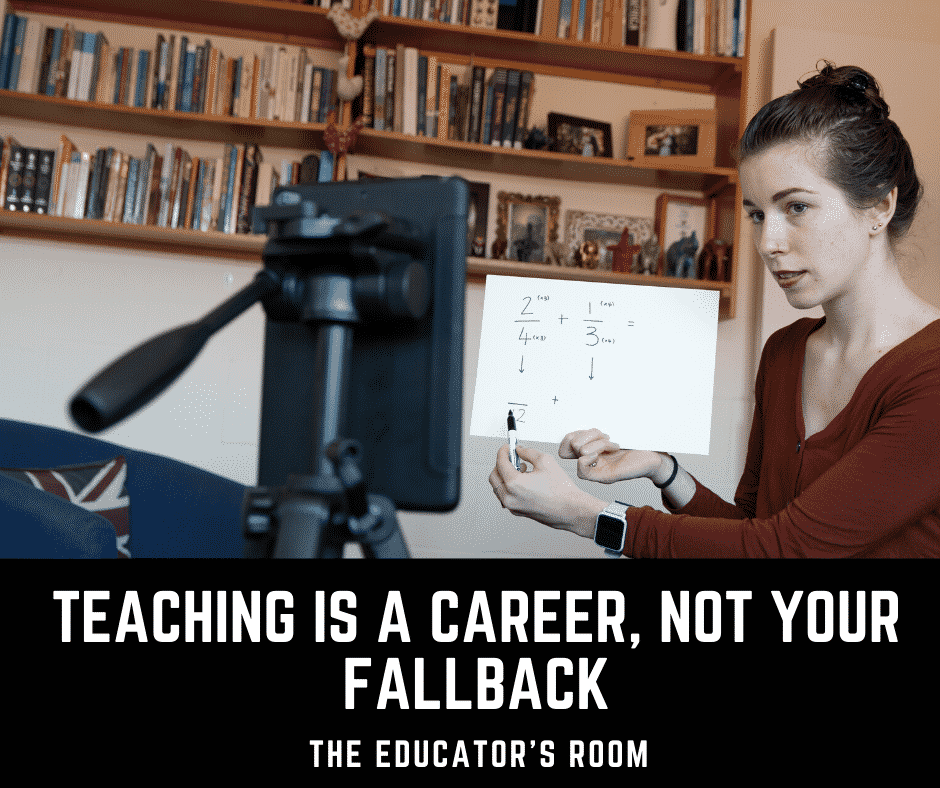If you are a teacher, you have probably had someone (or many someone’s) outside of education at some point in your career say that they thought about becoming a teacher, could be a teacher, maybe a teacher later if their current career does not pan out, or even teach when they retire. With the COVID-19 pandemic has come even more of these ignorant statements, with parents implying they are basically teachers now and deserve compensation. When people say this to a teacher, they think it is harmless or even something to say to relate to the person they are talking to in education. Well, if you have ever been that person, then this is for you.
Let me first outline what it takes for the vast majority of people to become a certified teacher. The traditional track is to get your Bachelor of Arts in education, and there are alternative options but they all include some kind of coursework (previously attained or presently needed). During that process, you also have to become certified (which varies state to state) but for the most part, it will consist of the following: interning at a school sometimes up to an entire year, student teaching for a minimum of one semester but usually an entire year, and taking certification tests.
During student teaching, you cannot work to support yourself and you will not be paid, plus you will be evaluated harshly to ensure you can cut it as a teacher. Certification tests also cost money and some are easy but many are difficult and some students have to take them multiple times (and imagine if you are a bad test taker!). Let’s not forget that while you are student teaching, you are still taking classes – so you are not able to work to support yourself, you are extremely busy with lesson planning and other outside work duties, and you must keep up with your university or other coursework – which also costs you more money!
It does not stop there.
Every state requires continuing education for teachers. Teachers have to take additional courses, professional development, and training in order to continue to be a certified teacher. And you guessed it, these can often cost money too! Some states even require their teachers to obtain a master’s degree within a certain time frame from initial certification in order to be recertified. Once again, the teacher is the one on the hook for shouldering the financial burden of being recertified. All of this, to have the privilege of obtaining a salary that is far behind professionals with the same educational attainment. Don’t get me wrong, we obviously are not in it for the money. However, it is worth mentioning that there are incredible financial obstacles to entering and maintaining a career in teaching, and I have not even touched on teachers spending hundreds or thousands a year for classroom supplies.
Alright so maybe you’re thinking, no big deal you can still keep the idea of teaching on the back burner for when your real career does not go as planned. Maybe you have even done something like babysitting or tutoring and think the skills will translate. Or, maybe you just really like kids so you think teaching would be second nature.
Do you have any idea what a day of teaching is like?
- Have you ever been in a room full of 30 elementary kids who are bouncing off the walls and smell like sweaty feet, or a room of 34 hormonal teenagers who would rather be snap chatting their date of the week than learning about The Catcher in the Rye
?
- Do you know how to handle the situation of a student speaking out of turn, or videotaping other students without permission, or swearing at another student, or god forbid a fight breaking out in the middle of your room?
- What ideas do you have for engaging students and what kinds of teaching strategies would you implement in your classroom?
- How important do you think it is to build rapport with your students, and how would you go about doing it? Can you be on your feet for hours at a time, hold your bladder potentially all day long, have less than 25 minutes for lunch if at all, and make thousands of split-second decisions in a day?
- Can you handle the secondary emotional trauma of finding out your student has been sexually abused, or is currently in an abusive home, or lives in astounding poverty, or has not eaten since lunch Friday and it is now Monday morning?
- Can you keep your cool when a student cusses you out, throws something across the room, refuses to listen, or gives you attitude?
Teaching is more than babysitting kids all day or helping them get through math worksheets. I think parents who have claimed to teach is not that hard during quarantine fail to really understand what goes into the materials we provide. Those materials are no substitute for a qualified educator who knows how to break down concepts, scaffold, and support the plethora of student needs. We spent hours of lesson planning to come up with new and exciting ways to engage students in content that they really couldn’t care less about. In the classroom, you have to know how to manage the room by walking a thin line between tyrant and friend, while also following administration expectations for how you conduct your classes. If the kids do not think you are authentic or do not like you, then you are going to have an incredibly difficult time teaching them.
As a teacher, you also have to know how to talk to students, get to know them, and support them – and more often than not this varies widely from student to student. You constantly get treated like less than a professional by society, parents, students, and often your own administration. Decisions that affect you will constantly be made without any of your input, and sometimes, your input can actually get you into hot water. You will be in a room with up to 40 kids at a time, sometimes with as little as a three-minute break between periods to collect yourself and empty your bladder. Tutoring is nothing compared to managing the emotions, mental well-being, behavior, and learning of diverse student populations. But not to fear, you will get to stay after school multiple days a week to provide tutoring to your students on top of the other paperwork and duties that keep you busy outside of school hours!
We have to love what we do because none of this really adds up when you think about it – the emotional exhaustion, financial investment, long work hours, and lack of appropriate pay or respect. It’s no wonder we as a nation have a teacher shortage. So when you think about telling an educator that you could be a teacher, stop yourself, and remember that their career is not your fallback. And ask yourself, would kids even want someone like you to be their teacher?







I really appreciate you posting this. This should be required reading for teacher college programs.